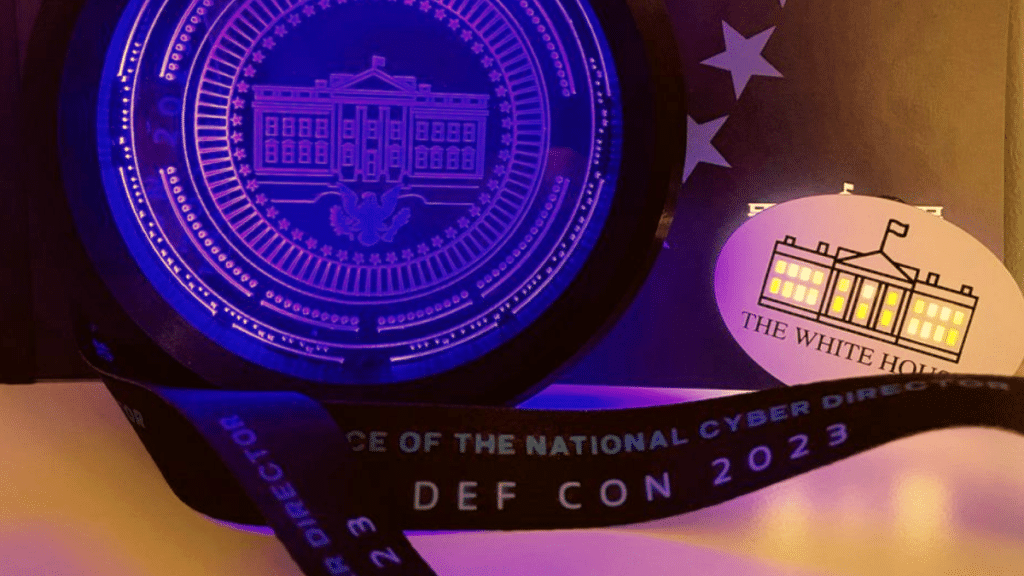Advocates Call for White House Action on AI Harms
Gabby Miller / Aug 11, 2023Gabby Miller is a staff writer at Tech Policy Press.

On Thursday, amid the frenzy of two of the world’s largest hacking conferences hosted in tandem in Las Vegas, Nevada each year – Black Hat USA and Defcon – the White House officially launched its artificial intelligence (AI) hacking competition.
Civil society groups and tech safety advocates used these same events, however, to put pressure on the Biden administration as it teases a forthcoming AI executive order.
The newly announced AI Cyber Challenge (AIxCC) is designed to spot software vulnerabilities to improve cybersecurity in the US as it frets over national security concerns posed by hostile governments. The Biden administration has posted nearly $20 million in prizes to be doled out over the next two years to top scoring teams in a multi-round, capture-the-flag style competition.
The open competition is a partnership between top AI companies Anthropic, Google, Microsoft, and OpenAI and the Defense Advanced Research Projects Agency (DARPA), an agency nestled within the Department of Defense that develops emerging technologies for the military.
This announcement is yet another example of the Biden White House expressing a sense of urgency in recent months to research and monitor the development and responsible use of AI. However, despite promises to pursue bipartisan legislation this fall, details are scant. President Biden says he plans to issue an executive order soon, but when and what that looks like remains unclear.
To influence the government, various civil society organizations, advocacy groups, and think tanks are now releasing policy recommendations ahead of Labor Day. While the details differ, many of the proposed frameworks overlap. Namely, groups want AI policy development to center civil rights protections and to build principles from the currently unenforceable Blueprint for an AI Bill of Rights into rules for the federal government and, where possible, into US law.
The Center for American Progress (CAP), a progressive DC-based think tank, and a group of civil society groups that includes Accountable Tech, AI Now Institute, and EPIC, released their respective priorities to coincide with the AI Cyber Challenge kickoff.
The coalition jointly announced its “Zero Trust AI Governance” framework, which offers policymakers a “robust and enforceable roadmap” for addressing the urgent risks posed by AI technologies. “We argue for vigorous enforcement of existing laws, a shift away from self-regulation by creating bright-line rules, and putting the burden on Big Tech to prove their systems aren't harmful,” a spokesperson for Accountable Tech told Tech Policy Press via email.
The group also warned in a press release that societal costs will arise from the current “corporate battle for AI supremacy” as unsafe systems are rushed to market and “recklessly” integrated into flagship products and services.
That same day, CAP made public a letter to the White House Office of Science and Technology Policy outlining its priorities for a national AI strategy. The strategy codifies the provisions of the Blueprint for an AI Bill of Rights as well as develops a national jobs plan and ways to reduce algorithmic discrimination and bias in automated systems. The letter also called on the Biden administration to set an end-of-year deadline for an AI executive order that takes “an all-of-government approach.”
On Monday, a different letter – undersigned by Algorithmic Justice League, Data & Society Research Institute, EPIC (again), Fight for the Future, and Upturn – was sent to the administration. It primarily asked that anti-discrimination testing be included in the pending AI executive order, as well as actions that “shift burdens towards companies that develop and use AI tools” to detect and address these issues, especially in key civil rights areas. Notably, the group also called for a dedicated office within the Civil Rights Division of the Department of Justice to expand the government’s capabilities to evaluate AI systems.
Executive action may be the only immediate movement on AI at the federal level. The 118th US Congress reconvenes in September, but while there are growing bipartisan calls to regulate AI, it remains an open question whether there is political will from either Democrats or Republicans to pass legislation ahead of an election year. And even if President Biden issues an AI executive order in the near term, actually implementing it could be a long way off. There may be reason to be hopeful about the prospects for AI policy in the long run, but as it stands, nothing about the near term is certain.
Authors
